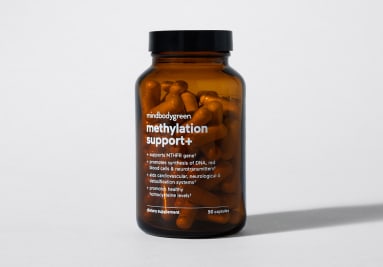3 Ways Folate Supports Both Men & Women In Their Everyday Health*



Folate, aka folic acid and vitamin B9, is an essential B vitamin that we need to get adequate levels of from combined sources (e.g., our diet, beverages, and supplementation) on a daily basis.
Folate is involved in a number of critical physiological functions that occur every day, and while it's notoriously known as a nutrient that women need to get enough of (especially during pregnancy), everyone needs it—yes, you too, men!
To show you just how important folate is to our whole-body health, we've outlined three major ways folate supports your cellular, brain, heart, gut, and immune health—every single day:*
1. Required for the methylation cycle to run properly.
Methylation is a complex physiological process that has vast applications throughout the body—it supports cardiovascular health, cognitive function, emotional well-being, DNA and RNA production, epigenetics, and more.
In more science-y terms, it is the transfer of methyl groups (i.e., one carbon and three hydrogen molecules, aka CH3) to and from various bioactive compounds in the body. Methylation is vital to the production of key neurotransmitters, amino acids, antioxidants, and hormones that directly affect multiple areas of health—and folic acid is supremely important in this process1.*
Folic acid directly enables the methylation cycle to run smoothly as a required nutrient for the conversion of homocysteine to methionine.* In its active, methylated form (i.e., 5-MTHF), folic acid regulates homocysteine metabolism (keeping it moving along, and not building up) so we can have healthy homocysteine levels.*
Homocysteine is an amino acid (aka building block of protein) that is very important in the body; however, when levels don't remain in check and elevate, it can have whole-body implications, from our heart and brain to our immune function.
This is why nourishing our bodies with folic acid each day (preferably in its bioactive methylated form, especially for folks with the MTHFR gene variant) is absolutely pivotal, as it keeps the "wheels" of the methylation cycle turning.* Activated (aka methylated) forms of folate do an excellent job of keeping these levels in check and supporting healthy methylation.*
2. Supports the gut's immune response.
You may have heard that a large chunk (like 70%!) of your immune system lives in your gastrointestinal tract. It's referred to as the gut-associated lymphoid tissue (GALT). But did you know that folic acid is right there on the front lines of GALT action, helping ensure robust immune function and keeping us healthy?*
Specifically, folic acid is involved in intestinal immune regulation. What does that mean, exactly? Well, this essential water-soluble vitamin promotes the survival of regulatory T-cells2 (an essential and specific type of white blood cell) in the small intestine.* Working side by side with vitamins B6 and B12, folic acid helps support a healthy gut to promote a strong and resilient immune response in the gastrointestinal tract.*
3. Promotes healthy brain function & mental wellness.
In addition to all of those benefits, folate is also majorly important for our central nervous system, supporting brain development and function as well as emotional health.*
Folic acid is critical for the production of neurotransmitters3 (such as serotonin, melatonin, dopamine, noradrenaline, and adrenaline)—largely due to its indispensable role in the methylation cycle described above.* That means adequate and daily intake of folic acid is playing a role in everything from mood and sleep to stress regulation.* Talk about brainy health benefits!
How to get enough vitamin B9 through diet & supplementation.
For both women and men, the recommended dietary allowance for folate is 400 micrograms per day. These daily requirements increase for women during pregnancy (600 mcg) and when breastfeeding (500 mcg).
You can support your daily folate intake with folate-rich foods (e.g., dark leafy green vegetables like kale, spinach, asparagus, and broccoli; liver; beans; and peanuts) as well as a supplement that delivers folic acid (such as a high-quality multivitamin or mbg's methylation support+).
If you do take a supplement that has folic acid (and the rest of a high-potency B vitamin complex, ideally), make sure you're choosing the premium methylated (aka bioactive) form of folate—5-methyltetrahydrofolate (5-MTHF)—for optimal bioavailability and efficacy in the body.*
The takeaway.
While its role in reproductive health is undeniable, don't underestimate the multifaceted actions of folic acid as the "pregnancy B vitamin." The fact is that folate is an essential nutrient that we all need for critical daily functions.
To ensure you're getting enough folate each day to support your methylation cycle, nervous system health, gut health, immune system, mood, and more, consider upping your leafy green intake (because greens are also full of other primo vitamins, minerals, fiber, and phytonutrients) and taking a high-quality daily supplement with active folic acid (5-MTHF)—such as mbg's methylation support+ which features the full array of activated B vitamins (B2, 6, 9, and 12) plus betaine.*

Morgan Chamberlain is a supplement editor at mindbodygreen. She graduated from Syracuse University with a Bachelor of Science degree in magazine journalism and a minor in nutrition. Chamberlain believes in taking small steps to improve your well-being—whether that means eating more plant-based foods, checking in with a therapist weekly, or spending quality time with your closest friends. When she isn’t typing away furiously at her keyboard, you can find her cooking in the kitchen, hanging outside, or doing a vinyasa flow.

